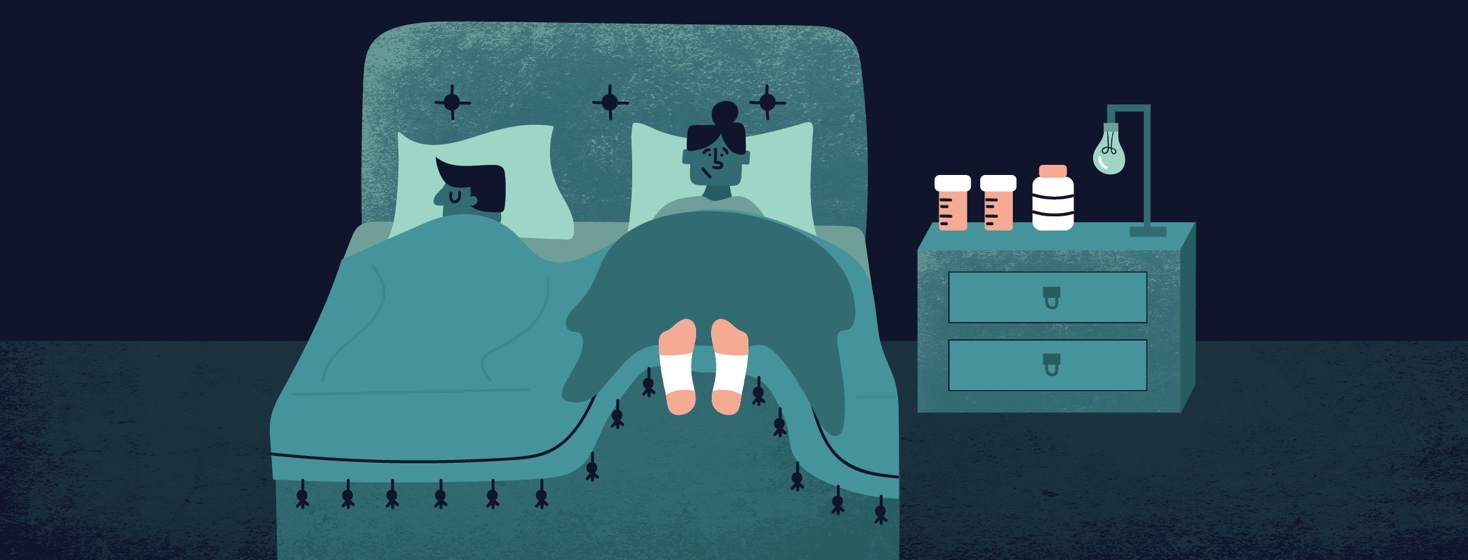How I Deal With Painsomnia
I learned about "painsomnia" from Dawn Gibson, a fellow health advocate who writes for AnkylosingSpondylitis.net. Like the name suggests, it's pain that keeps you up at night. Gibson and I don't have the same condition. But I know exactly what she means when she says doctors don't really "get it" when it comes to sleep hygiene and chronic illnesses. They think we just need to turn off our laptops before bed and do something relaxing.
But that kind of advice "is for muggles" Gibson told me. "It just doesn't work for us." I couldn't agree more. That's why I'm glad we're all part of a community where we can share what does help.
Painsomnia doesn't keep me up every night, but it does happen at least a couple times a month. Here's how I deal.
Keep meds nearby
I have several categories of pain that can affect my sleep. That includes:
- Pelvic pain: Sometimes ovulation can cause a sharp pain that radiates to my tailbone. It's like appendicitis, but it also hurts my butt and makes it hard to breathe. Then there's blood-curdling period pain. Ibuprofen can usually take the edge off enough that I can get back to sleep.
- Back and leg pain: I could probably include this in pelvic pain, but it's different. I take ibuprofen for this too. Sometimes I get out of bed and do stretches if I feel tingling. My physical therapist taught me a few.
- Gas pain: I get a lot of bloating when I eat, and I guess the gas bubbles get pretty big. I almost went to the ER the first time I got this kind of pain, except it hurt so bad I couldn't walk. I literally thought my stomach might explode. Thankfully, simethicone (Gas-X) breaks up the bubbles so they're easier to pass. And the pain usually goes away 20 minutes after I take a pill. Otherwise, I'd be cramping for hours.
- Bladder pain: I can go years without interstitial cystitis (IC) issues. But sometimes — out of nowhere — my IC will flare up before or during my period. With my doctors permission, I take over-the-counter bladder analgesics that work really well. The most common kind is called phenazopyridine hydrochloride. That's a pill sold under the brand name AZO. It turns your pee orange. (If your bladder pain continues for more than a few days, it's best to check with your doctor. They should make sure it's not a UTI.)
Get the bedroom temperature right...for me
One of the most useless tips I hear is to sleep in a cool room. According to the National Sleep Foundation, the "ideal" temperature for a good night's rest is somewhere between 60-67 degrees. Ideal for whom?
I live in Wisconsin, but I don't do well in the cold. And by cold, I mean anything less than about 70 degrees. It makes my whole body hurt. Sometimes my toes turn white and icy, even when I'm inside and fully clothed with socks on. I'll say it again: I'm extremely sensitive to low temperatures. And so are a lot of people with chronic pain or sensitive central nervous systems.
In the winter, I turn the heat down to 68 so my husband doesn't sweat through the sheets. But over on my side of the bed, I'm covered in two blankets, thick socks, and a sweatshirt. Even with all that, my feet can feel like blocks of ice. My blood vessels start to constrict to keep my internal organs warm — at least I that's my theory. That's why I keep a space heater at the ready. Otherwise, my body will hurt too much for me to doze off.
Other sleep hygiene tips
I do think it's important to keep up good nighttime habits, even if they don't help with pain specifically. For me, that includes:
- No caffeine after 11 a.m.
- No phone scrolling in the bed
- Get up at the same time every day
- Melatonin for pre-period insomnia
I also have a white noise machine — a fan called Snooz — and a weighted blanket. Both help me sleep through the night a lot easier.

Join the conversation